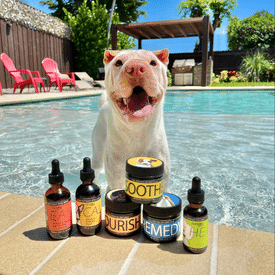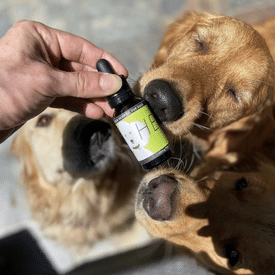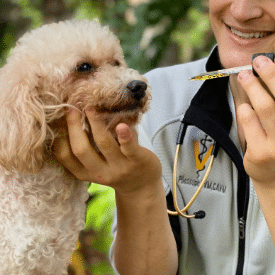Lymphoma in Pets: How CBD Can Help!

Lymphoma is a cancer type that occurs in the lymphatic cells and quickly spreads through the remainder of the body. Lymphoma is known to be one of the most treatable cancer types because it’s highly responsive to therapies.
Table of Contents
What is Lymphoma?
Lymphoma occurs in cells known as lymphocytes (T-cells and B-cells) which are part of the immune system. They are a type of white blood cell which circulates throughout bodily fluid known as lymph. The T-cells and B-cells (lymphocytes) are responsible for ‘taking out the trash.’ They fight and destroy bacteria in the body along with any other foreign substances they come in contact with.
When these cells become cancerous, they are no longer able to hold their duties. This process is called lymphoma and it can develop in T-cells, B-cells, or both.
Breeds at Risk
According to The Dog Cancer Survival Guide, there are several breeds which are genetically prone to developing lymphoma. Breeds who are most prone include:
- Boxer
- Basset Hound
- Saint Bernard
- Scottish Terrier
- Airedale Terrier
- Golden Retriever
- Labrador Retriever
There are also breeds who are least at risk. Those breeds include:
- Dachshund
- Pekingese
- Pomeranian
- Brittany Spaniel
- Chihuahua
- Toy Poodle
- Female dogs who aren’t spayed have also been found to have a decreased risk of lymphoma.
Signs of Lymphoma
The largest sign of lymphoma is actually visual. You can visually see the lymph nodes are swollen significantly. They’re usually discovered at first just by petting the dog. Common areas you may find swollen lymph nodes include below the jaw, behind the knee, and in front of the shoulder. The lymph nodes will generally feel firm when swollen and can be moved back and forth beneath a dog’s skin. They’re usually not painful to the touch.
Canine Lymphoma Test
There’s now a test available to screen for lymphoma. The veterinarian will draw your dog’s blood which will then be tested for biomarkers. Some veterinarians prefer not to do this test, and skip straight to aspirating the tissue (taking a very fine needle to draw out some of the tissue- biopsy). They are both non-invasive and the fine needle aspiration may be more accurate.
Western Treatment
The conventional treatment for lymphoma is chemotherapy. In severe cases, surgery and/or radiation may also be recommended. Most dogs with lymphoma go into remission following treatment (that’s where the canine lymphoma test would likely come in handy). The most common protocol is known as CHOP (C-Cyclophosphamide; H- Hydroxydaunorubican; O- Oncovin; P- Prednisone); a multi-drug protocol lasting up to 25-weeks.
Most dogs go into remission with this protocol, but there are chances of the white blood cell count lowering during the treatment. If this happens, the medication is adjusted accordingly.
Healthy Diet
Providing a healthy diet is critical with any form of cancer. Actually, it’s important in every dog regardless of if there is cancer or not, but it is particularly important in cases like these. Cancer cells absolutely love sugar. Unfortunately, most kibble diets contain over 50% sugar, which fuels cancer spread. Rodney Habib, one of the creators of the Dog Cancer Series, and Dr. Karen Becker (DVM) created a video outlining just how much sugar is in each bag of dog food (even prescription dog food). It’s a must-watch for any dog lover.
Aside from commercial dog food, you do have several options. You can order your dog’s food from a responsible pet food company who often develops the food themselves (sometimes it arrives dehydrated and you simply add water). You can cook the diet yourself based on recommendations from your veterinarian or canine nutritionist. Or, you can provide a raw food diet. Every dog is different, and every dog’s body is different, so consulting with a professional regarding which option to choose is critical. Your dog’s current health, history, and environment will all be among the factors considered when developing the best diet for your dog.
CBD and Lymphoma
CBD can provide support for dogs with lymphoma. Dogs who are being treated may experience nausea and appetite loss. CBD may help increase appetite and reduce the feelings of nausea. CBD is also a cancer-fighter on its own reducing inflammation and boosting the immune system.
A process known as apoptosis, or cell suicide, also plays a key role here. Cancer cells don’t die on their own. CBD encourages the ‘bad cells’ to die while keeping the good ones alive. Research has found both THC and CBD can kill cancer cells and prevent further growth.
CBD also prevents the development of blood vessels (angiogenesis) in tumors. Cancer has the ability to create its own blood supply within the body to “feed.” CBD prevents this from happening and essentially ‘starves’ the cancer.
According to Cancer Metastasis Review, “ Despite the lack of preclinical and clinical data, there is a strong agreement that pharmacological targeting of the endocannabinoid system is emerging as one of the most promising new methods for reducing the progression of cancer. In particular, combination therapy utilizing both traditional chemotherapeutics and molecules targeting the endocannabinoid system may be an excellent next generation treatment for cancer.”
Related: CBD for Cancer in Dogs on Youtube
Whole Patient Approach
Dr. Trina Hazzah, DVM, specializing in Complementary and Alternative Medicine has an unconventional approach to handling canine cancer. Instead of focusing primarily on conventional Western therapies like chemo and radiation, she combines both Eastern and Western medicine to provide every possible option.
The goal of integrative medicine is to better support the immune system, decrease the number of pharmaceutical treatments necessary, increase quality of life, and improve the survival rate of each individual canine cancer patient.
There is a delicate balance combining both therapies and Dr. Hazzah strives to ensure every patient is provided optimal care. Her goal is to provide the pet parent with every option possible so, when weighing out the options, everything that’s possible can be offered.
She also integrates cannabis medicine into her whole patient approach. Prior to educating patients on cannabis medicine, Dr. Hazzah spent years on research, reading literature, attending conferences, and learning from those in practice. She is now one of the practitioners providing the advice and conducting the lectures for others who want to learn.

CBD Success Story: Potato
Potato, a 14 year old Shih Tzu had Multi-centric Lymphoma and Cushing’s Disease and had one eye. Her tumors shrunk to half the size by 6 months and she went into remission 12 months after starting her holistic protocol of natural plant and mushroom medicine, and all signs of Cushing Disease were gone at 14 months. She died of dementia at age 16.5 years old. Here’s more about her.
Related: Potato’s Holistic Lymphoma Protocol
The Bottom Line
Dog lovers who decide to treat lymphoma are generally pleased with the outcome. The cancer is well-known for going into remission with a little help and guidance. Following treatment, most dogs are able to live relatively normal lives. We know it’s scary to hear the words, “your dog has cancer,” but calm your mind knowing this is one of the most responsive cancers to treat.
Ultimately, it’s your decision about what you feel is best for your dog. Reviewing the options, weighing out the pros and cons based on what your veterinary oncologist views as the best option, and getting a second opinion are all aspects that can be taken into consideration in regard to the treatment of lymphoma.















